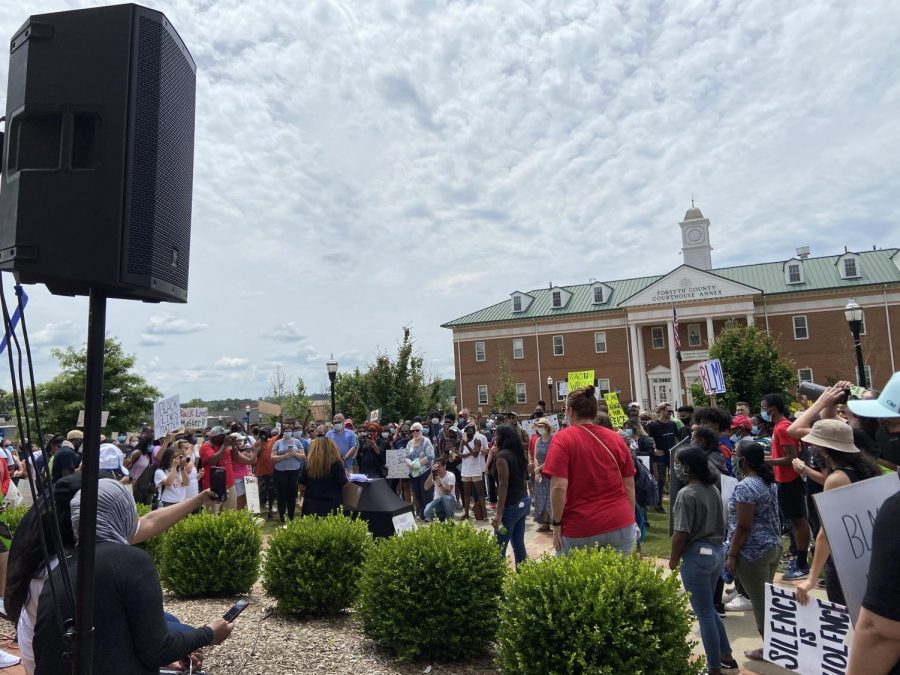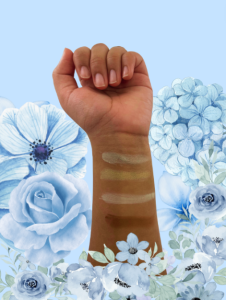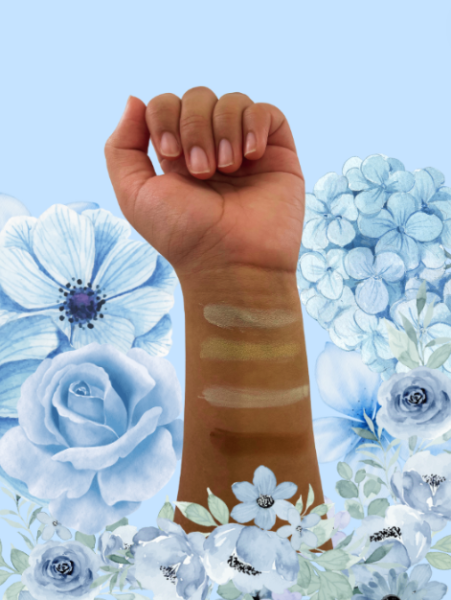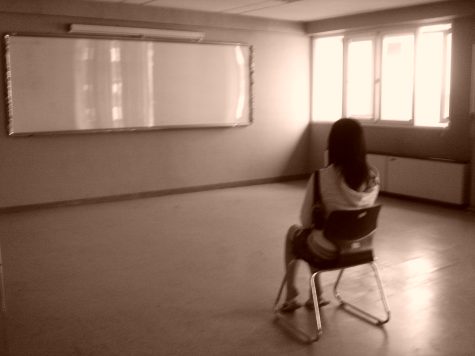Social Justice in Forsyth County: A conversation with Patrick Phillips, author of Blood at the Root
Used with permission from a SFHS student who wants to remain anonymous
A community comes together. During the height of the social justice protests of summer, hundreds of people gather at the Forsyth County courthouse to protest. Forsyth County residents felt it absolutely necessary to voice their anger over recent killings of Black people. “It really helped me to feel more understood and valued in the community” said a SFHS student who wants to remain anonymous.
August 24, 2020
Disclaimer: The opinions expressed in this piece belong solely to their respective author(s). They do not necessarily represent the opinions of South Forsyth High School or Forsyth County Schools.
Over the course of the spring and summer of 2020, many protestors across the nation hit the streets to raise their voices in anger over the killings of Black people by police. The social justice protests that have happened seek reform in the training of police so that Black members of the community can feel safe.
Over 900 Forsyth County residents showed up at the Forsyth County courthouse on June 7, and the image is reminiscent of protests happening across the nation.
As a Black teenager in America, I have been closely watching how the protests have been unfolding. I am reminded, too, of a book I recently read titled Blood at the Root: A Racial Cleansing in America by former Forsyth County resident, Patrick Phillips. In the book, Phillips documents the events of September 1912, a dark moment in the history of Forsyth County when over one thousand Black residents were driven from their land and expelled from the county.
I contacted Mr. Phillips after George Floyd’s death, and interviewed him on his thoughts about the current state of America in the midst of this social transformation. We talked about his experiences growing up in Forsyth County, his opinions about the current state of affairs, and his reasons for writing Blood at the Root. What follows is our interview:
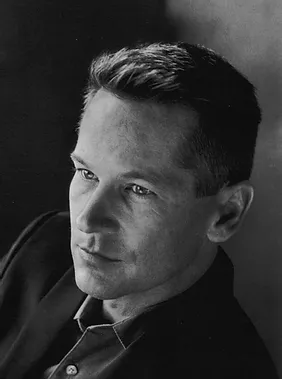
Patrick Phillips’ first book of nonfiction, Blood at the Root: A Racial Cleansing in America, was published by W. W. Norton and named a best book of 2016 by The New York Times, The Boston Globe, and Smithsonian.
What led you to write Blood at the Root?
I was led to research and tell the story in Blood at the Root because I grew up in Forsyth, and had only ever heard legends about the African American community that once lived there. It was a kind of ghost story I heard from kids on the school bus, about how whites once “ran out all the black people.” I knew there was an allegation of rape by young black men, but I didn’t know anything specific about who, what, where, why and when the expulsions happened. I didn’t even know if the story was really true, or just a kind of racist myth. So about fifteen years ago I started collecting old newspaper articles from 1912, then letters by people who’d lived in the county then, and eventually ever scrape of information I could find about the violent months of September and October of 1912, when white mobs really did run out more than a thousand black residents of the county. I also used Ancestry.com to locate descendants of the victims, and began interviewing them, to add their oral history to the documents I’d found.
As a kid, and as a teenager who witnessed the violence in 1987, I remember thinking “What is wrong with these people?” That’s what I was trying to find out in the book, and getting closer to an answer took me all the way back to the Cherokee removals in 1838, and deep into the stories of specific people involved in the violence of 1912, and specific families who were the victims of it. It also required that I look at the way the county erased its real history, and engaged in willful ignorance about the past.
Ultimately, I was motivated by a desire to fact-check all the racist lies I was told in the 1970s and 80s, and hopefully replace them with a documented, reliable account of what really happened. As a kid in the county, I asked a librarian for a book that would explain all this, and she told me that there was no history of the county. It took half my life, and it scared me to death, but I eventually decided to write that book myself.
How does Blood at the Root explore racial segregation in Forsyth county?
Blood at the Root explains that the racism that brought attention to Forsyth in 1987 (when a peace march was disrupted by a white mob) has very, very deep roots, and a very complex history. The violently enforced segregation of the county ended in the 1990s, and I know it is now a more diverse place, especially in terms of Latino/a and Asian residents. But the black population is still less that 4%, and I know the county still has a reputation for bigotry among many communities of color. My book tried to explain how all of that came to be, as one generation after another was taught the culture of racism and bigotry that became dominant after the expulsions of 1912. I know there has been a lot of progress, but at the same time the county has never really faced its history publicly, never apologized or made reparations to the families whose land was stolen, and whose lives were impacted. I wrote the book above all to tell the truth, but I also hoped it might lead to change. I think the jury is still out on that one.
Pressed to boil it down, I’d say that Forsyth is unique as a place that actually succeeded in creating a “whites-only” zone and defending it for almost a century. That’s a lot of bigotry passed down from generation to generation to generation, and it ended less than thirty years ago. I think that in some of the old families of the county, prejudice runs very deep and change will come only once they are forced to acknowledge the truth about how the county became so prosperous. All that wealth was built on a foundation of lynching, arson, and land-theft, and at least for the moment, no one has ever been forced to apologize, or compensate the victims, or even publicly acknowledge what happened.
I am of the opinion that while it is left unexpressed, such bigotry isn’t gone, it’s just dormant, and likely to burst into the open again at any point. Our current president’s overt bigotry and anti-immigrant rhetoric has emboldened racists all over the country, and I’m afraid it wouldn’t surprise me to see the old hatred come to the surface again in Forsyth county, especially as its communities of color grow. Again, these are all the reasons I wanted to write the book, so thanks for such terrific questions.
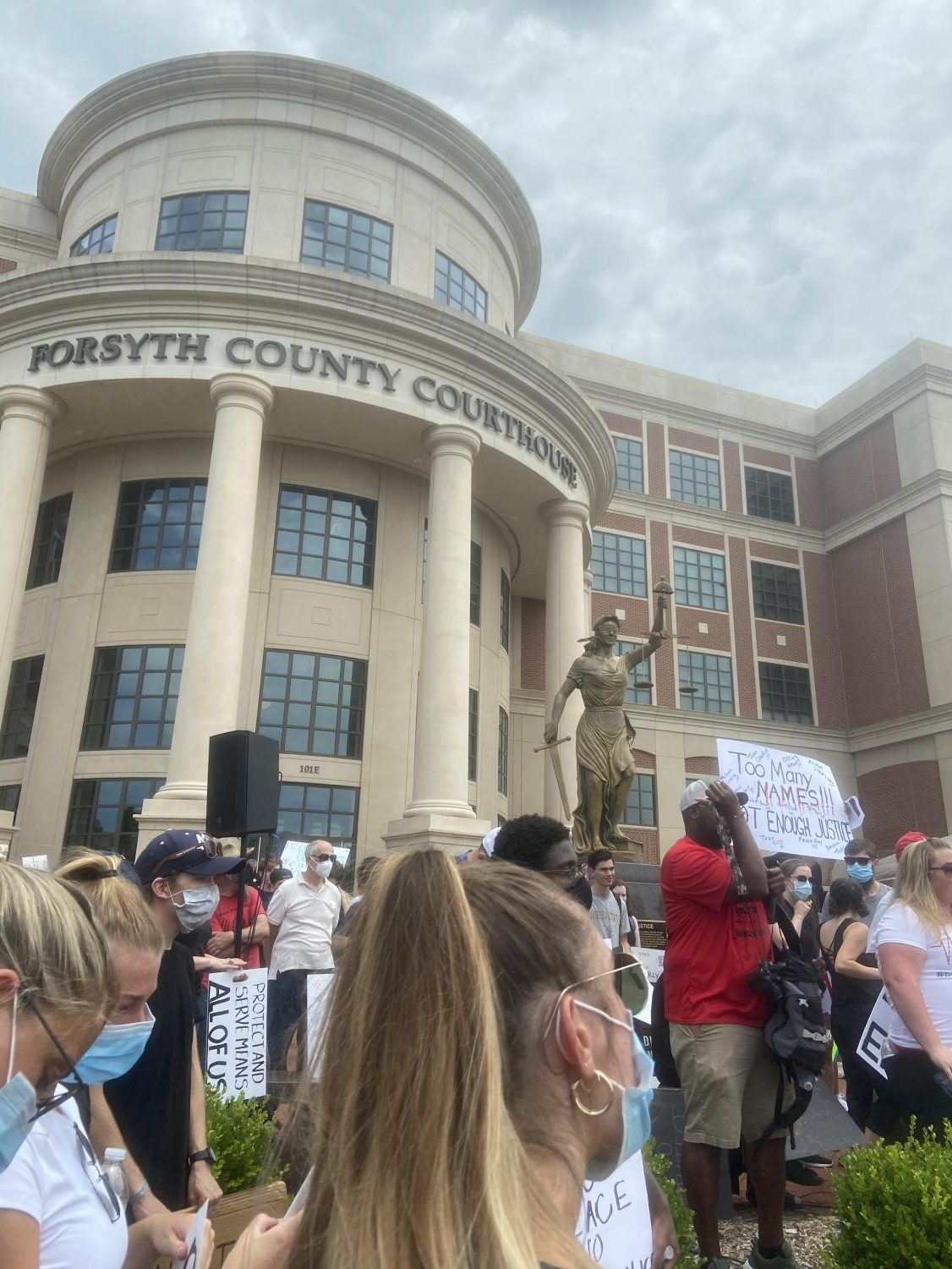
In spite of injustice occurring in the black community, many Americans still say that White Privilege is non-existent. What is your take on this controversial topic?
I think anyone who says that is delusional and is ignoring the evidence right before their eyes. Rather trying to correct that kind of cold-hearted indifference here, I’d give white people who say that three books. These writers make the case much more forcefully than I can: Michelle Alexanders’s The New Jim Crow, about the profoundly racist origins and outcomes of our criminal justice system; Douglas Blackman’s Slavery by Another Name, about the origins of much of our nation’s corporate wealth in the racist system of convict leasing that grew up after Emancipation; and Bryan Stevenson’s Just Mercy, about how racist policing and criminal justice looks on the ground, as it devastates the lives of innocent, hard-working people.
Do you think the police system is being held responsible for the deaths they have caused? Should the departments continue their methods of protecting, or does an alteration in rules need to be made?
A number of reforms are vitally needed. The long-standing legal doctrine of qualified immunity protects police officers from many criminal prosecutions due to the nature of their jobs, and has been questioned by many people, including conservatives like Supreme Court justice Clarence Thomas. Police union contracts often call for the destruction of disciplinary records after a few years, which is a policy that all but acknowledges the need to shield union members from the consequences of their own violent actions. And our police need to be demilitarized, given the way that they now patrol the streets like soldiers, outfitted due to sky-high budgets and the transfer of ex-military gear from the armed services. All of these things clearly need to change, and I’m no expert on the many ways we might reform the police. But to me there is no question that such reform is long overdue.
Do you think that racism towards the Black community has increased or decreased in our modern world? What signs or personal experience made you believe so?
Again, I’d refer anyone interested in this question to Michelle Alexander’s book The New Jim Crow, and Ibram Kendi’s book Stamped from the Beginning. They both argue that talking of racism increasing and decreasing is the wrong metaphor. Instead, racism never rises or falls, it just mutates: from slavery to Jim Crow to segregation to mass incarceration to police killings of unarmed civilians. These are all part of the same uninterrupted pattern of racism that has been part of our country’s story from before its official founding. To see what I mean, read the New York Times’ series The 1619 Project.
What are thoughts that go through your mind when African American families lose a loved one because of racial inequality and don’t receive the justice and closure they all deserve?
My thoughts are grief, sadness, shame for white America, and outrage at those who either deny the suffering of their fellow Americans, or even worse, stand in defense of the status quo.
How has your view and perception of the police changed recently?
I think that the emergence of cell phone video cameras has changed most white people’s sense of the police, and led most people of color to nod with sad recognition when they see the undeniable evidence of brutality that was always part of American policing, whether it was filmed or not. I have not been naive about the racist outcomes of policing at least since reading W. E. B. Du Bois’ Souls of Black Folk (1903), where Du Bois makes the point that our modern police state grew out of the antebellum slave patrols, and always had the control of black bodies as its prime directive. And Dougls Blackmon’s book makes it clear that shortly after enslaved people were Emancipated, police started arresting them in order to force them to labor on the farms and in the factories of wealthy white man. So unlike a lot of white people I’m not surprised to learn that our police regularly attack and kill innocent people of color. That said, I am appalled and saddened and outraged to finally, because of phone technology, to see the horrifying videos of those attacks and killings.
Why do you think George Floyd’s death shook the country? What about his part in the world grabbed everyone’s attention?
I don’t think anyone can answer that question precisely. It was a particularly chilling and horrifying video. It followed very shortly after the killing of Ahmaud Arbery, in another horrific attack. And because of Covid-19 much of the country was home and able to take to the streets… and perhaps even enthusiastic about taking to the streets after so much quarantine, and so much outrage. I’ve joined protests in Brooklyn, NY, and what strikes me most of all is the young age of so many of the protestors. So perhaps another factor is that a new generation has come into its own, and sees that something must change.
Do you think we would still be facing the inequality issues of today if we never had slavery in this country?
This is a really big question, and to me it’s almost impossible to imagine an America in which slavery never occurred, since that history is American history. Absent the transatlantic slave trade, there is no free labor to build a cotton empire in the deep south, and absent that cotton empire, there is none of the wealth and prosperity that have made America the country we know. I can highly recommend some further reading if you want to dive deeper into this question, as it’s much larger than the scope of my book. A great start would be the New York Times’ 1619 Project.
I think white Americans have always told themselves (and American students) a very optimistic, self-flattering version of our history, in which slavery is an unfortunate mis-step in what is otherwise a story of freedom, liberty, and nobility. Alas, I have rejected that narrative, and now see slavery as an institution at the heart of America’s rise to global prominence.
In the same way, I was always told that there were no slaves in the counties of north Georgia, only hearty white “pioneers” who cleared and worked the land themselves. But census records and tax rolls from the 1800s show that to be a lie, and an attempt to whitewash the history of the county. In truth, slavery is as much a part of Forsyth’s history–and its 19th century economy–as any other place in the south. To spare themselves shame, I think, a lot of people like to rewrite the past and leave out the painful parts. I wrote my book because I’d had enough of that kind of denial, and I now see turning and facing the truth as essential to building a more just future.
And even if you could wave a magic wand and make it so that slavery never occurred, the land under your feet in Forsyth would still be stolen land, taken from the Cherokee Nation by President Andrew Jackson and land-hungry white Georgians, in defiance of the Supreme Court and innumerable treaties. I have a chapter on that part, but if you get interested in learning more, I can highly recommend Steve Inskeep’s book Jacksonland.


